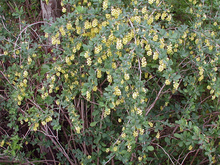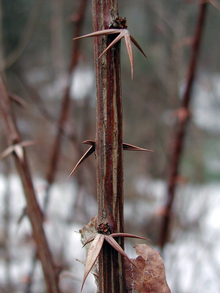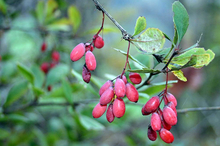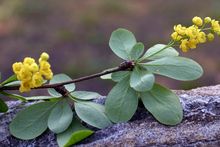Quick facts
Common barberry is a MDA Prohibited noxious weed (Control List).
- Common barberry grows in a variety of conditions; found in dense woods, pastures, roadsides and other disturbed areas.
- It has long-lived seeds and a high germination rate, and can hybridize across species, showing mixed characteristics.
- It is an alternate host for black stem rust that hurts small grain crops such as wheat, barley and oats.
- Common barberry can grown into dense stands that outcompete native species and reduce wildlife habitat and forage.
Common barberry should be reported. The Minnesota Department of Natural Resources provides detailed recommendations for reporting invasive species.
How to identify common barberry
- Deciduous shrub that can reach 13 feet.
- Can have 20–30 erect stems that are spread apart and droop at the ends.
Stem
- Gray, shedding bark has sharp, double- or triple- branched spines along branches.
Leaves
- Green, oval, 1/2 to 2-1/2 inches long and 1/4 to 1-1/4 inch wide, occurring in clusters of 2 to 5 leaves.
- Margins are serrated with 8–30 teeth per leaf.
- Red in the fall.
Flowers
- Small, yellow, and less than 1/4 inch wide and 0.2‒0.4 inch long.
- Appear in showy, drooping, 1- to 2-inch-long clusters of 10 to 20 yellow flowers each.
- Unpleasant odor.
Fruit and seeds
- Oblong berry, up to 0.3 inch long, bright red and fleshy, persists through winter.
- Contains 1 to 3 black seeds that may remain viable for 9 years in soil.
Roots
- Root and rhizome growth is often extensive, with the root crown being a thick mass of fibrous roots.
- Rhizomes are produced from the root crown and usually grow a few inches below ground.
- Severing a rhizome will result in reproduction.
Reviewed in 2019





